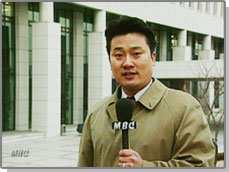|
|
|
|
leesangho.com은 고발기자를 자임하고 그동안 현장을
지켜온 이상호기자가
네티즌과의 연대를 통한 사회변혁을 꿈꾸는 곳 입니다.
 "MBC 시사매거진 2580", "사실은" 프로그램의 탐사, 고발전문기자. "MBC 시사매거진 2580", "사실은" 프로그램의 탐사, 고발전문기자.
68년 서울에서 태어나 연대 경영학과 졸업 후 같은 대학에서 국제정치학 석사학위를 받고, 박사과정을 수료함. 현재는 '한미동맹과 언론'에 관한 논문으로 박사를 받았다.
95년 MBC보도국에 입사한 이후, 이상호 기자는 그동안 경찰, 법조, 카메라출동, 외교부 등을 출입했으며, 한때 MBC 연예뉴스 앵커로 활동하기도 했다.
하남국제환경박람회를 고발해 그 해 한국신문방송인클럽 언론대상을 수여한 바 있으며, 한국기자협회가 수여하는 이달의 기자상 등 사내외 특종상을 다수 수상했다.
기자의 본분을 비리고발이라 믿는 그는, 사십차례에 달하는 각종 소송과 살해위협에도 불구하고 탐사보도 연구와 취재에 매달리고 있다.
|
|
|